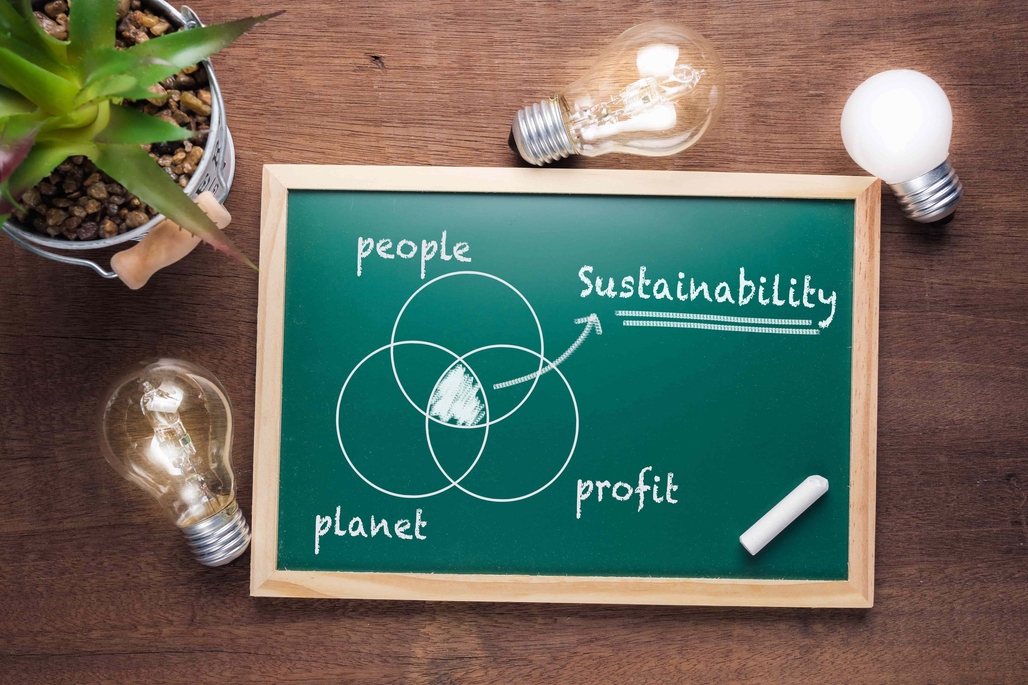How to Make Your Business Sustainable

1) Keep Sustainability in Mind
Always re use and recycle whatever materials you may have, and consider sustainability in your decision-making processes, as well. You can also align your business with the following 5 waste management hierarchy:
1. Prevent – minimise your waste
2. Reuse – pick items which are multipurpose
3. Recycle – when discarding, recycle your materials
4. Recover – consider progressive ways (i.e waste into biofuel)
5. Dispose – discard your waste in the garbage/land fill

You can also keep sustainability in mind through self-taught methods such as videos or linked in learning. Alternatively, you can certify yourself and your company through attaining certificates, or an education/degree which aligns with sustainability.
Consider different principles and models which can be applied into your company, such as the triple bottom line:
• Profit: This is the traditional measure of corporate profit—the profit and loss (P&L) account.
• People: This measures how socially responsible an organization has been throughout its history.
• Planet: This measures how environmentally responsible a firm has been.
Other models that have become important through the rise of environmentalism and equity are the Earth Charter and the United Nations Sustainable Development Goals. The Sustainable Development Goals are an agenda developed by the United Nations which aims at prosperous development for humans and the planet. All of the goals aim at actualizing a vision of a world which commits to intergenerational justice and sustainability through the lens of 17 goals (no poverty, climate justice, etc). 193 countries around the planet have committed to taking the necessary steps in implementing the United Nations Sustainable Development Goals locally and globally.
2) Reduce your GHG’s & Invest in Renewables
Always consider all the facets of your company/business. The best decision you can make for yourself, the future generations and the planet is to minimize your GHG emissions.
1. Reduce Your GHGs Through Transportation
Could you take public transportation? Would it be possible to work from home a few days a week to minimize your commute?
2. Sustainable Infrastructure
Is the company you drive residing within sustainable infrastructure or could it use improvement? Could you use solar powered systems and photovoltaic energy to run your business?
3. Turn Off Your Lights and Appliances
It is important to reduce and minimize your energy consumption. Alternatively, you can also install LED lightbulbs.
4. Reduce Your Carbon Footprint
Consider eating less meat a few days a week, travel smart, and reduce your waste.
3) Invest in Ethics

Many people around the world are becoming increasingly aware of the impact that their spending has. Consider becoming an “ethical consumer” who uses money to support ethical and sustainable businesses that advocate for and supply fair trade, organic, and locally sources goods. A fair-trade organization is an organization which ensures sustainable pricing for their goods, fair terms and agreements for farmers in developing countries, as well as safe conditions.
Every morning or afternoon when you purchase your coffee and tea, or your meal before returning to your desk, consider purchasing from an ethical source. Perhaps, even try eating less meet a few days a week, too!
4) Develop a Purpose-driven Organization.
One of the most important ways to develop your business is to align it with an authentic purpose that fits well with your business interests which ultimately, guides your decisions for the present and the future. Try focusing on a purpose, values, and a mission. Employees will always love being involved with an organization that provides them with a sense of purpose and meaning, allows them to devote themselves and encourages and validates their support.

You can align your business with a purpose through understanding the needs of your workforce. Begin by asking questions to your employees, listening, and reflecting upon their needs. Empathy is a highly undervalued skill in the workforce which can enable understanding. If employees feel fully supported, and are working towards a common good, such as sustainability or climate change solutions, they will feel willing to learn more, to take great risks, and to contribute to the best of their ability. In opposing situations, where workers are not valued, their often fail to see any opportunities presented, they will be resistant to any conductive feedback, are more prone to conflict and under performance.
When authenticity and purpose is embodied in your business, the good of the employees and the good for the collective become aligned. Positivity, collaboration, performance and learning all exponentially grow. Everyone leaves the workplace feeling inspired, and your customers are just as re-energized.
Darwin stated that it was survival of the fittest and the strongest. In the workforce, and today… it is not always the fittest and strongest businesses, but the most adaptable and innovative which survive and thrive. Develop yourself and your employee’s operational skillset – continuously provide training, professional development, solutions-driven mindsets, and more. As a business leader, always ensure you are communicating yourself with authenticity and commitment. Employees look to business leaders as an influential source of inspiration, and your own belief in the greater purpose of your company can reaffirm your employees’ beliefs in the company, as well.